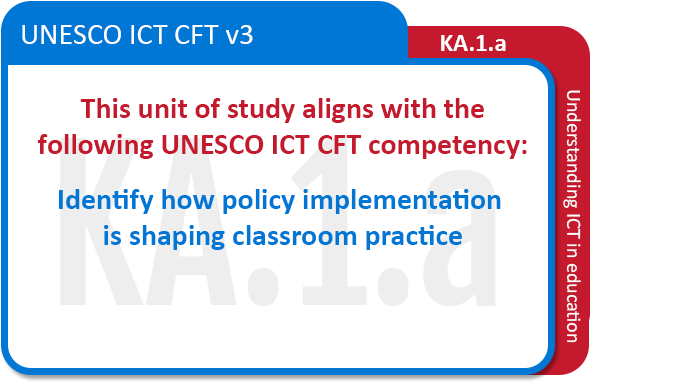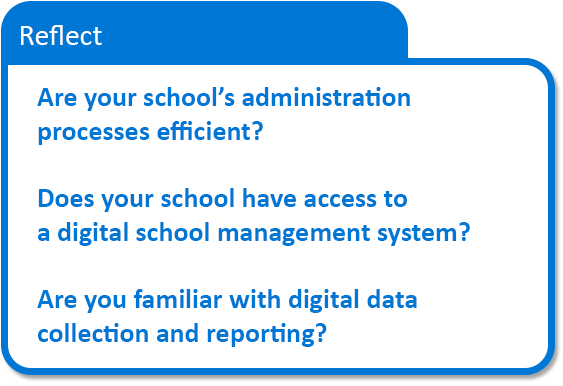Topic outline
Welcome and introduction


Nation building and you - What is your role in terms of the country's technology and education priorities?Governments and their education ministries across the globe have for some years now been reflecting on what role information and communication technologies (ICT) might play in the provision of national education. As you will see when working through these units, simply supplying technology will not enhance teaching, learning and school administration. In fact ICT, when not implemented thoughtfully, has proved an enormous waste of precious resources in some countries. To this end, many ministries are releasing policies that outline their vision and strategy to integrate technology into education.
Some countries have developed and published policies that focus specifically on the relationship between ICT and education, sometimes called an ICT in Education policy, while others have amended existing policies, such as the education and/or technology policies, to provide directives on how ICT should be integrated into education. In all of these policies however, the role of the teacher, and what they do with technology, is key.
In this unit of study we will investigate what has emerged as global good practice in terms of ICT and education, as well as identify what your role is in this regard. As an introduction consider the video below that demonstrates how educators, ICT and development are linked to national priorities.
- View

By the end of this unit, you should be able to use ICT to:
- Appreciate your significant role in national development
- Be aware of the potential benefits of ICT in teaching and learning
- Be aware of the potential benefits of ICT in class and school administration
- Be aware of the potential benefits of ICT to your own continuing professional development
- Be able to identify specific ICT skills you wish to acquire using the UNESCO ICT competency framework for teachers (CFT).

ICT benefits for teaching and learning

Benefits to your students and you
It is now a given that ICT can play a positive role in teaching and learning. There is a consensus that if used thoughtfully, ICT can support and enhance learning. Some researchers even advocate that ICT can be used as a catalyst to transform teaching and learning, to move away from traditional and inefficient teaching and learning strategies. ICT, by providing new and powerful tools at the disposal of students, allows us to more easily adopt progressive teaching and learning methodologies. Consider some of these these potential benefits:- View
In what ways have you already used ICT in your teaching? Use the forum below to volunteer ideas about how you have enhanced teaching and learning in your subject using ICT. Look at what others have written and reply to at least two posts that have given you a new idea for a future lesson using ICT.
- View Post replies: 2 Make forum posts: 1
There are many units in this ICT Essentials course that focus on specific ICT skills and knowledge to enhance teaching and learning. Consider studying these 'Knowledge Acquisition' units for a deeper skill and understanding:- Unit 02 - ICT to support teaching and learning
- Unit 06 - Using ICT to support assessment
- Unit 08 - Use a word processor for teaching
- Unit 09 - Use a presentation package for teaching
- Unit 10 - Use the internet for teaching
- Unit 14 - Use a spreadsheet for teaching.
ICT benefits for school administration

Benefits for the educational institution
You, your school and the national education authority, also derive benefits from the use of ICT by streamlining administration. From your perspective, ICT can help you track attendance, watch individual student progress, create reports and track your subject departmental budget. Both the school and the education authority require data to make informed planning decisions. They need to collect information about student enrolments, student promotions, school procurements of consumables, external service providers, teaching materials, etc. ICT can efficiently and quickly coordinate and process all this data and provide statistics and analytics.Many schools use a school management system to capture this data, and many education departments have set up networks that centralize the data sent electronically from multiple schools.
Reflect on these potential benefits for your school:

ICT benefits for soft skills and teacher CPD

Benefits for you and the students beyond the curriculum
Besides using ICT to support curriculum objectives, the use of digital technologies provides users with soft skills that are valuable beyond school. Familiarity with, and confidence using, popular digital tools are prerequisites in the eyes of many recruiters and prospective employers. By using technology as part of the learning process we also provide students with skills that can be transferred to the workplace.ICT can also provide you with an advantage as you develop as an educator. Familiarity with, and confidence using, ICT provides you with access to and the tools to engage with numerous online continuing professional development (CPD) opportunities. Whichever direction you choose, education management, subject specialization, etc. there are courses online, some of them free.
In this ICT Essentials course there is a specific unit that will investigate continuing professional development in more detail. Consider studying Unit 17 - ICT to grow professionally.
ICT challenge - digital divide

A potential downside to technology
In the previous sections we have championed the benefits of ICT but there are also some challenges associated with ICT, or more accurately, lack of ICT! Many national ICT in Education policies attempt to address one obvious downside of ICT roll out in education: what happens to those who do NOT have access to ICT? Educational technology, it is argued, if not distributed fairly, can exaggerate the gap between the 'haves' and the 'have nots'. Keep in mind that 'have-nots' can be defined by socio-economic group, by gender, by age etc. Those who have no or poor access to ICT are immediately disadvantaged compared to those who do. This is called the Digital Divide debate, and is something education policy writers want to avoid. To understand the argument watch the video below.
Are there any strategies to mitigate the digital divide in YOUR classroom? Is there a role for you? Consider the reading below,- View
The reading above demonstrates that tackling the digital divide is not only for people within the education ministry but that you can play a role too! Use the forum below to discuss the following: 'How can I ensure that I don't perpetuate the issue of unequal access among my students? How might I help those with poor access within my own community?' Brainstorm some strategies with others in your class.
- View Post replies: 2 Make forum posts: 1
ICT competency framework for teachers (CFT)

ICT competency frameworks for teachers
So what ICT competencies should you aim to acquire in terms of your own skills development?
National ICT in Education policies often identify building teacher ICT capacity as a key area. Some even prioritize certain skill sets. There are many ICT competency frameworks for teachers (CFT) available globally. In this course each unit focuses on a particular ICT/education competency drawn from the UNESCO ICT CFT. These competencies are varied and span policy, pedagogy, curriculum, assessment, organization, administration and professional development. If you are interested to know the logic behind the selection of the competencies review the resources below:
- View
A copy of the latest version of the UNESCO ICT CFT can be downloaded below:- View
Alternative ICT CFTThe UNESCO framework is not the only ICT CFT used by policy writers. Another popular ICT CFT is from the International Society for Technology in Education. Access the ISTE standards for teachers below and do a comparison between the two frameworks. Note that they tackle the identification of ICT skills for education very differently.
- View
Topic 7

Journal entryUse the journal tool below to reflect and record your response to some of the questions we posed during this unit:
- Are your school’s current administration processes efficient? If not where do you think they might be improved?
- Does your school have access to a digital school management system? If so, do you personally feel it impacts positively on your own productivity and professionalism, if not why not? what are the barriers to adoption in your school?
- Are you familiar with digital data collection and reporting? Do you use technology to support your education duties, e.g. mark book, attendance register, report creation, for example?
Note only the facilitator and yourself can access the journal. It is not a public document so be candid.
Conclusion, attribution and licence


We have considered benefits of ICT for education. We have looked at the challenge of the digital divide. We have also identified two frameworks that identify desired ICT competencies in educators, but what exactly does your national ICT in education policy identify as your role in integrating ICT into education? It's time for you to go to the education authority's website and find the appropriate documentation. What does it say about the role of the educator or teacher?
Don't expect, however, detailed directives about what you are supposed to do. Policies tend to describe the vision in very broad strokes and at a very high level. Hence, it's also worth investigating what your education authority says about the role for technology in further publications and strategy plans. These strategy documents often have a lot more detail and are more useful to teachers.

The following Open Educational Resources were adapted to create this unit of study,
- ITU. (2015). ICTs for a Sustainable World. Available on YouTube. (CC BY).
- MGSLG. (2018). Imperatives in the South African ICT in Education Policy. Available online here. (CC BY-SA)
- Rwanda Education Board. (2017). ICT and Policy. Available online here (CC BY-SA).
- UNESCO. (2018). ICT Competency Framework for Teachers (version 3). Available online here. (CC BY-SA).

The following references were consulted in the development of this unit of study:- ISTE. (2020). Standards for Educators. Available online here. (C)
- Johnson, D. (2015). Power up! / Helping to close the Digital Divide. Available online here. (C)
- Lowe, S. (2014). Why is technology important to education? Available on YouTube (Std. YouTube Lic.)
- Make4Prosperity. (2018). Digital Divide Available on YouTube. (Std. YouTube Lic.)
- ISTE. (2020). Standards for Educators. Available online here. (C)


ICT Essentials for Teachers by UNESCO is licensed under a Creative Commons Attribution-ShareAlike 4.0 International License.
All content not licensed under a Creative Commons licence is all rights reserved, and you must request permission from the copyright owner to use this material.